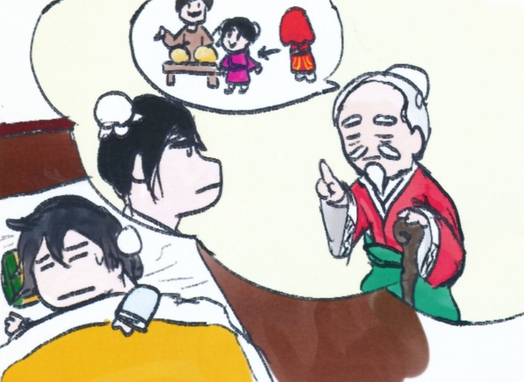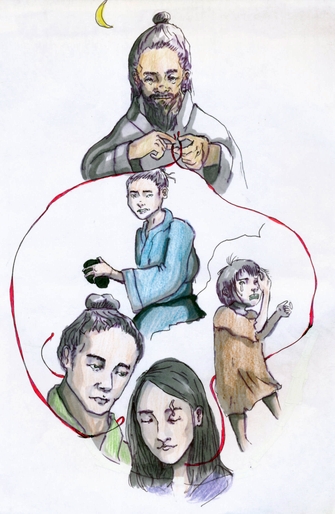
“A few days later he had a dream in which he was told that he was destined to wed the girl who worked in the fruit stand across the street.”
(Drawing by Jenny L. Wu, John Muir College, UCSD, Class of 2019, by permission.)
Yuèlǎo 月佬 (Old Moonie) = An odd old man with a bag of red cords,the controller of marriage destinies; fond of moonlight
ZHĀNG Huí 章回 = a traveler
WÈI Gù 韦固 = An eager young bachelor
ZHĀNG Qīngjùn 张清俊 = a smart but impetuous youth
A little girl with a snotty nose working in a fruit stand
Part 1: Zhāng Huí Meets Old Moonie. It is said that in the Táng 唐 dynasty (period 12) a man named ZHĀNG Huí 章回 visited the city of Sòng 宋 where he came upon an Old Man sitting beside the road with a bag, reading a book in the moonlight. He asked what was in the bag, and the Old Man explained that it was full of red cords used to tie together people destined to marry. Once people were tied together, there was no way that they could avoid marriage. Furthermore, he told Zhāng Huí that he had already tied him to a wife.
Zhāng chuckled and went on his way. Not long afterward he met the wife who had been tied to him and they were married. This is why today any matchmaker can sometimes playfully be called an “Old Man in the Moonlight” (Yuèxià Lǎorén 月下老人) or simply “Old Moonie” (Yuèlǎo 月老 or 月佬).
Part 2: Wèi Gù Meets Old Moonie. Sometime during the Táng 唐 dynasty (period 12) a man named WÈI Gù 韦固 was in the early stages of engagement to a woman, with whom marriage arrangements had been begun but whom he had not seen, and it was arranged that he would catch sight of her before a certain temple at dawn. Filled with excitement he arrived well ahead of time. Sitting before the temple was an old man with a large bag and a book.
Wèi Gù greeted him and, to make conversation, asked about the bag and book. The old man replied that the bag contained red cords to link couples that the book told him were destined to be married. Such binding was then unbreakable. And he assured Wèi Gù that his marriage was already determined. And so it was; the engagement was finalized that same day, the marriage followed soon after, and the couple lived happily ever after.

Part 3: Zhāng Qīngjùn Meets Old Moonie. The father of a certain ZHĀNG Qīngjùn 张清俊 was a high official. As a consequence the family was quite wealthy and Qīngjùn was rather spoiled. When he was still a precocious (but spoiled) thirteen-year-old, Qīngjùn dared to disbelieve this story when he learned it from his tutor.
A few days later he had a dream in which he met the Old Man and was told that he was destined to wed the girl who worked in the fruit stand across the street. When he awoke he was skeptical, but as a matter of curiosity he went out to have a look at the girl.
She was six years old; she was completely filthy; and she had an entirely disgusting stream of snot running from her nose. He was horrified and furious, and in childish frustration, he threw a rock that hit her eyebrow and sent her crying into the house. (That was, of course, very naughty on his part, but thirteen-year-olds —especially spoiled ones— can be quite naughty sometimes, which is why their fathers must occasionally beat them.)

A decade passed, and Zhāng Qīngjùn, now 23, was still precocious, but much better behaved, and had grown both handsome and charming. He took the imperial exams and received first place. Since he was such an especially appealing marriage prospect, his father carefully arranged for him a marriage to none other than the daughter of the Prime Minister.
Part 4: Zhāng Qīngjùn Meets an Uncomfortable Truth.
After they were married, Qīngjùn noticed a scar on his bride’s eyebrow, and it developed that she had received it years before when a brattish little neighbor boy had suddenly thrown a rock at her. At that time she worked in her parents’ fruit stand, but the business had failed and both parents had died in a boating accident on the river, from which she had escaped. The prime minister had happened upon her and adopted her.
Zhāng Qīngjùn was horribly embarrassed, but his study of the ancient classics had made him honorable, so he confessed that he had been that nasty little boy, and he explained about meeting the Old Man in his dream.
As punishment for his attack on her, his new wife playfully condemned him to a lifetime of putting on her eyebrow makeup each day in a way that would cover the scar.